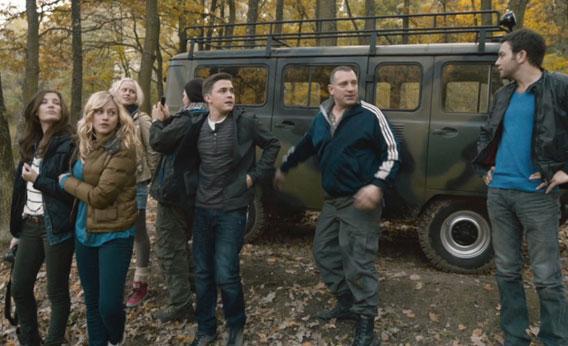The Chernobyl Diaries, directed by Brad Parker from a story idea by Oren Peli (who also produced and co-wrote) had promise as a horror-movie idea: Six featherbrained American tourists hire a Ukrainian “extreme tourism” guide to take them on a day trip to the ruins of Pripyat, the workers’ town that was abandoned after the 1986 Chernobyl nuclear disaster. The combination of “final girl” slasher movie with contemporary political allegory could have made for a bracing genre scramble, a discount version of Joss Whedon’s Cabin in the Woods. And Peli, the creator of the sui generis Paranormal Activity franchise, is an interesting figure on the horror landscape. Like them or not (I do, mostly), the Paranormal movies have a distinct directorial voice: They’re claustrophobic and incrementally scary, low on gore but high on suspense. Those movies commit fully to the conceit that every image should be “found footage” filmed by the characters themselves, and find clever ways to work within that technical constraint—like the nifty shot in Paranormal Activity 3 when a character mounts a home video camera on the engine of a rotating fan, creating a repetitive horizontal pan of the room as scary shit goes down on both sides.
That kind of cinematic inventiveness is direly absent from Chernobyl Diaries, which also contains about as much political allegory as a box of Goobers. Better titled Six Dumbasses in Search of a Clue, the movie opens in party-town Kiev, where Chris (Jesse McCartney) is visiting his older brother Paul (Jonathan Sadowski), who’s a student there. Chris has a serious girlfriend, Natalie (Olivia Taylor Dudley), and Paul has just started dating Amanda (Devin Kelley). In addition to looking like Gap catalog models, all four seem well-heeled and without a care in the world—now who’s up for a whirlwind tour of the smoldering corpse of the world’s worst nuclear disaster?
Even after they meet up with Uri (Dimitri Diatchenko), the beefy, evasive tour guide who assures them they’ll be in the hot zone too short a time to run any risk from the radiation, this foursome’s not-a-good-idea radar doesn’t go off. Nor does that of Michael (Nathan Phillips) or Zoe (Ingrid Bolsø Berdal), a pair of European backpackers who join them for the Chernobyl jaunt.
Uri drives them to the eerily silent ghost town of Pripyat, where, after finagling his way past the border check, he lets the group explore a few of the crumbling barracks and take smiling cellphone pictures of themselves against the backdrop of the nearby reactor. After a couple of red-herring jump scares that are more annoying than frightening, Uri’s van breaks down, and the cognitively challenged protagonists begin to grasp their situation: They’re stranded in Carcinogen-town, without cellphone service, as night falls and the radioactive wolves begin to howl.
There actually are radioactive wolves, and other species affected by the Chernobyl disaster, living and adapting in fascinating ways in the woods now retaking the real-life site—a fact which, had it entered into the story, could have made for an interesting combination of evolutionary-science thriller and pick-‘em-off horror film, another potentially good movie this isn’t. Instead of mashing up genres, Parker goes straight to mashing up people, throwing the characters one by one to the mercy of mutant wolves and (at least so it seems) possibly mutant humans as well.
Parker’s minimalism does make for a handful of legitimately scary moments. He uses no music, except for an occasional pulse of thudding percussion, and gets a fair amount of mileage out of simple things-that-go-bump-in-the-night suspense (though when the gore comes in the second half, it’s plenty gruesome). But any further craft lavished on this screenplay would be wasted: Less than a half-hour in, you already don’t care which, if any, of these one-dimensional characters survive the onslaught. You might actively root for their collective demise, if you could rouse yourself to care one way or the other. Go gallivanting in Chernobyl and you get what you pay for, nimrods.
Chernobyl activist groups have protested this movie’s flippant association of those affected by the real-life disaster with homicidal flesh-eating freaks. I don’t know whether to applaud these efforts—the movie is, without question, in atrociously poor taste—or to assure those offended that, however icky the existence of Chernobyl Diaries may be, it doesn’t matter. Unlike the grave consequences of the awful event they survived, this movie will disappear from the earth in no time at all.
